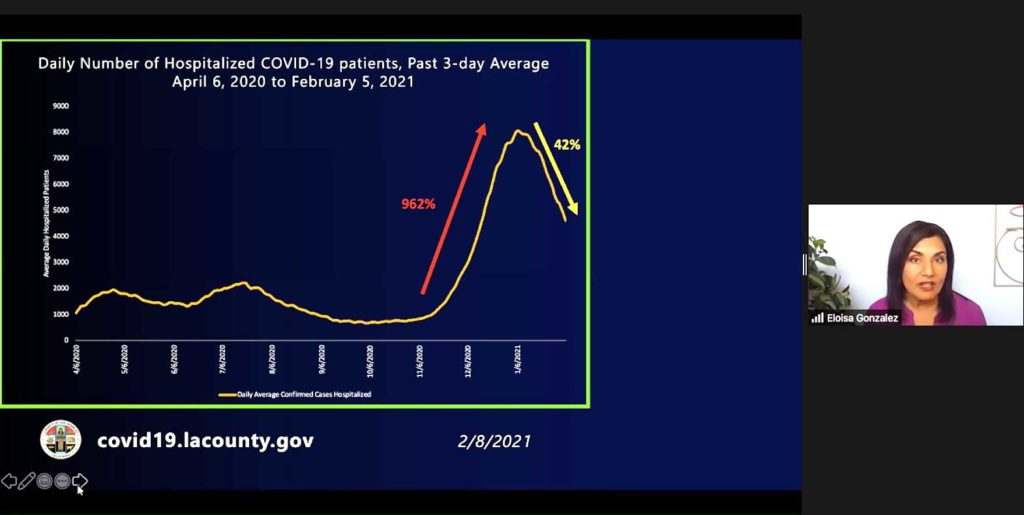Covid cases decline in LA area, but deaths remain high

Eloisa Gonzalez, director of cardiovascular and school health at the Los Angeles County Department of Public Health, told a news briefing that Covid-19 cases and hospitalizations in L.A. County have declined in recent weeks, but death rates remain high.
LOS ANGELES – L.A. County has seen a gradual and steady decline in Covid-19 cases and hospitalizations in recent weeks, though hospitals remain crowded and death rates remain high, county health officials say.
“For death rates to significantly decrease, case rates need to drop much lower,” Eloisa Gonzalez, director of cardiovascular and school health at the Los Angeles County Department of Public Health and director of integrative medicine at The Wellness Center at LAC+USC Historic General Hospital, said Thursday, Feb. 11, during a virtual news briefing.
“This is why it’s so important to recognize that now is the time to take more precautions – not less – if we want to support forward movement in our recovery journey.”
Daily cases are averaging at about 4,500, a sharp decrease compared to the 15,000 daily average in early January. Hospitalizations peaked on Jan. 6 with more than 8,000 daily on average. As of Feb. 5, that number was at about 4,600, Gonzalez said.
With high hospitalization rates, more people are expected to die from COVID-19 in the coming weeks, Gonzalez said.
As of Jan. 31, the county continued to see more than 200 deaths on many days.
“The number of people dying from COVID-19 remains distressingly high,” Gonzalez said.
Meanwhile, more than 2 million doses of the vaccine had been administered in L.A. County as of Feb. 9. The vaccine is free for residents and the county has been working to ensure residents who want to get vaccinated will be able to do so. A shortage in supply, however, has been a major hurdle in vaccine rollout.
Dr. Karen Kim, director of primary care clinical quality at the Los Angeles County Department of Health Services, said that the agency has vaccinated more than 12,600 patients since December of last year.
Most of its vaccine recipients come from communities of color, including about 60% who are Latino, 10%who are black, 10%who are Asian and 15% who are mixed and of other races.
The agency, which sees nearly 500,000 patients across 30 sites in the county, has been reaching out to patients by phone, email and text message to ensure residents know if it’s their turn to get vaccinated.
In the hardest hit areas, the department has been going door-to-door to provide information about the vaccine, Kim said. It is also in the process of identifying local partners, such as pharmacies and local community clinics, to increase the number of vaccination sites in high-need areas where a large proportion of eligible residents have yet to be vaccinated.
Gonzalez said that for undocumented residents who may be concerned about the privacy of their information the Department of Public Health is not sharing that information with any immigration agencies and that medical information is confidential by law.
Only proof of residence in L.A. County will be required to receive the vaccine. Citizenship or legal permanent residence is not required.
Vaccines are currently being administered to healthcare workers, individuals 65 and older, and those who work in agriculture, and food, education and childcare, and emergency services. In March, individuals between the ages of 16 and 64 who are at high risk of suffering or dying from Covid-19 will be eligible.
Gonzalez noted that people will only be able to receive the vaccine when they are deemed eligible and that there is no way to get it in advance. She cautioned residents against potential scams around the vaccine, as well as those promoting dietary supplements and other cures for the disease.
Even after getting vaccinated, people are urged to continue wearing a mask and practicing social distancing, as it is still possible for those vaccinated to transmit the coronavirus.
Dr. Raymond Perry, director of Hubert Humphrey Comprehensive Health Center, a clinic of the Los Angeles County Department of Health Services in South Los Angeles, said he has seen excitement among patients at the center about the vaccine, although there are many who are hesitant as well.
One of the main reasons people are reluctant, he said, is because of how quickly the vaccine was produced.
“The reality is that this vaccine went through the same approval steps as other vaccines,” he said. But it was developed more rapidly due to the impact of Covid-19 on communities and economies. It received more funding than other vaccines in the past, which allowed to get more done in a short period of time.
The widespread impact of the pandemic also made it easier to find volunteers to participate in clinical trials, something that can typically lengthen the development of vaccines, Perry said.
He also said that although the vaccine is new, the technology used to create the it has been studied for decades. It doesn’t give people a weakened or dead version of the virus as other vaccines do, teaches the body to fight the coronavirus, and helps makes symptoms less severe if an individual does get infected, Perry noted.
“I understand that how quickly it happened can cause some concerns and doubt from people,” Perry said. “So I think it’s really important that we just reassure people, particularly those in communities of color, to understand that this vaccine was developed safely and that it’s proven to be effective, and that we’re fortunate to have this vaccine to try to combat the pandemic.”
L.A. County residents who want to schedule a vaccination appointment can visit vaccinatelacounty.com or call 833-540-0473 between 8 a.m. and 8:30 p.m.

